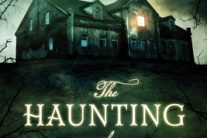 Hope Island
Hope IslandBy: Tim Major
Release Date: June 8, 2020
Publisher: Titan Books
Received From: Publisher
(All reviews are our own, honest opinions.)
Rating:
Tim Major’s novel Hope Island is a slow-burning, introspective horror novel with elements of gothic literature. The story follows Nina Scaife and her daughter Laurie. Nina’s husband, Rob, has recently walked out on her, and the pair have just arrived at Hope Island to visit his parents. However, the island isn’t all it seems. The children are eerily silent, the islanders act oddly, a newly discovered archaeological site is drawing attention, and to top it off, a body is found lying on the beach.
Told from Nina’s point of view, the story is quite slow and introspective. A workaholic and newly single mother, Nina is determined to reconnect with her daughter, spend time with her ex-in-laws, and figure out how to tell teenager Laurie that her father has left the family. Nina is the best kind of unreliable narrator. Her world has recently been shattered, and her views, deductions, and decision-making abilities are obviously impacted, sometimes quite seriously. Wrapped in grief and the fear of needing to explain the unexplainable to her daughter, she pushes through each day one a time with an unseen but often felt threat looming all the while.
Nina may be trying to discover whatever secret Hope Island so obviously holds, but the story is truly about Nina finding herself, her own voice, and her place within her immediate and extended family. On the one hand, this is largely portrayed very well, drawing readers into Nina’s mind as she grapples with what happens now that she is a single mother. How does she navigate spending time with her now ex-in-laws, grandparents her daughter Laurie adores? How do you come to figure out what your next step is when everything feels wrong, surreal?
On the other hand, there is an undercurrent that leaves a bit of a sour aftertaste. The story pushes Nina’s failings as a mother, and it pushes them rather hard. Though the story is told from her point of view, this does come rather blatantly from other characters, ones who usually don’t offer up much of any follow-up to this. Nina also seems to come to a single conclusion: that she is a bad mother. While it is true that she wasn’t around quite as often as she could have been and was the breadwinner of the family, does that mean she’s failed? This is especially muddied with being the mother of a teenager. It’s only natural for certain things to remain private from one or both parents as children age, especially when your parents are in the midst of a messy separation.
The writing itself is stellar, bringing readers directly into Nina’s head. Suspense lingers on the edges of every page, tension expertly built throughout the novel before coming to a head in the closing chapters. The narration changes ever so slightly towards the end as events get tenser and characters increasingly frightened and stressed.
However, the story isn’t as cohesive as it could be. While much of the narrative is placed solidly in a mix of gothic horror, folk horror, and character study, the end very abruptly finds itself in a supernatural horror story. The ending is quite out of place, not matching the three hundred prior pages at all, leaving the conclusion feeling very out-of-left-field in an otherwise tightly plotted story firmly grounded in reality. Plot threads and characters were left extremely open-ended, sometimes being abandoned altogether. The story becomes increasingly surreal, and as Nina is confused by the unexplained and supernatural elements, so is the reader.
Unfortunately, the tale didn’t quite make its ending. That said, there is a very introspective element to Hope Island that those who prefer quiet, slow-burning stories focused on character development may find quite interesting.






Post a comment